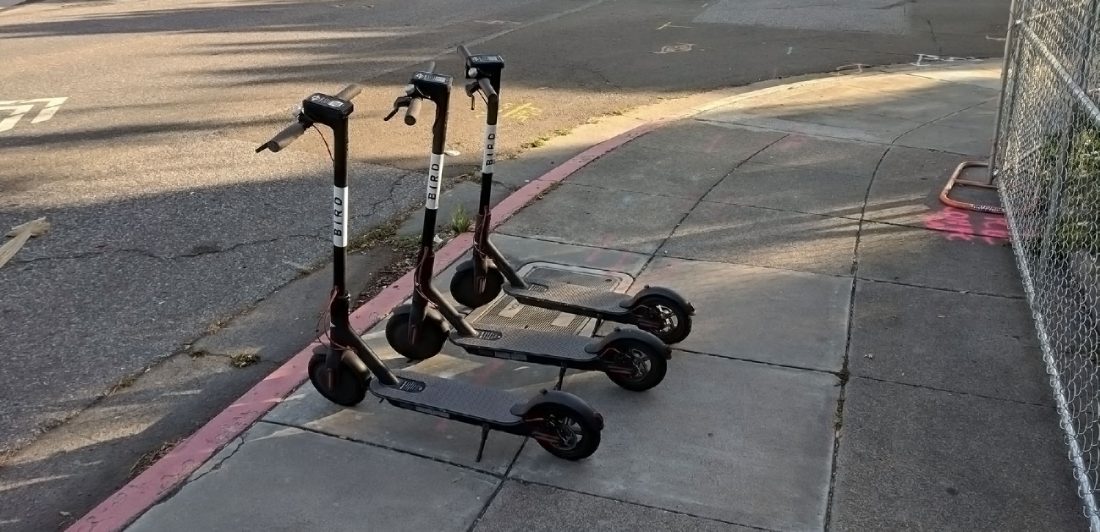A short-term vehicle, such as a dockless scooter, is a convenient way to commute around the city. Users scan QR codes, their driver’s license and pay with a credit or debit card to unlock the device. Once unlocked, a user can zip to their next location and leave the motorized scooter for the next person. While convenient, the short-term vehicle market is increasingly becoming a problem for cities. In addition, as more people suffer injuries on electric transportation, they are seeking the experience of a scooter injury lawyer.
Dockless electric scooters are appearing, seemingly, overnight in cities across the United States. Whenever a dockless scooter company comes to a new a city, it brings with it two legal questions:
- How will the city regulate motorized scooters; and
- Who is liable if there is an injury?
Dockless Scooter Liability is Determined by Who is At-Fault
To answer these questions, we need to discuss what dockless scooters are and the problems they are causing. Dockless mobility consists of vehicles, such as bicycles or scooters, that do not require fixed docking stations for users to receive or return units. Users can unlock the scooter using their smartphone and then drop them anywhere. This business model is in contrast to docked sharing, where users must pick up and return devices to a fixed station.
As these devices move into different cities, people have begun reporting several types of incidents leading to serious injuries.
Device malfunction
Users have reported single-rider accidents in which the brakes lock up or the rider loses control of the scooter.
At-fault scooter driver
Drivers in passenger vehicles have reported vehicle damage after being hit by scooter riders. Instead of stopping to exchange insurance information, scooter operators drive off.
Injuring pedestrians
When operated on the sidewalk, there is also the risk of an electric scooter user running into pedestrians and seriously injuring them.
Hit and runs
In addition to scooter drivers hitting pedestrians, there is also the risk of passenger vehicles, commercial vehicles, and city buses hitting people on scooters.
How are Cities Regulating Dockless Scooters?
In addition to injuries and concerns of liability, in many cases, rental scooters, bikes or mopeds just begin appearing on city streets. This puts cities in a bind trying to figure out how best to regulate these devices. Because dockless scooters don’t have a public fixed location, these devices can litter city streets and storefronts. These scooters raise concerns like zoning, safety and right-of-way issues. Without regulation, any combination of these issues could pose a serious risk to pedestrians.
Many cities have passed ordinances that include reporting topped or improperly parked units to the city. The city will then impound units in violation of ordinances. In addition, cities will limit the area these devices are available as well as require licenses and applications for the businesses to operate within city limits. In Austin, for example, part of obtaining a license to operate in the city requires companies to carry liability on riders.
Cities are also requiring limits on speed. Additionally, some are planning to improve or install bike lanes for the safety of both pedestrians and scooter users.
Cities may have to adopt emergency administrative rules governing dockless mobility. The rules governing dockless mobility include, but aren’t limited to:
- Where the scooters can be operated
- Designated parking for the scooters
- How fast scooters go
- Liability insurance
- Helmet requirements
Liability in a Scooter Accident
When a rider signs up with companies such as Bird Rides or LimeBike, users agree to a liability waiver on the app before being allowed to use the equipment.
In the vast majority of cases, the person who rents the scooter is liable for injuries they sustain as a result of the ride. They are also liable if they injure another person or damage property. However, you may hold a scooter company liable when someone can prove the cause of an injury was a result of scooter malfunction.
If you suffered a scooter injury and were not at fault, you may be able to hold the guilty party accountable.
Dockless Mobility Safety Tips
- Pedestrians First: Yield to people walking on sidewalks and crossing intersections. Remember, you are considered a vehicle.
- Park Responsibly: Park in a secure, upright position. Use designated areas, such as furniture zones of sidewalks, public bike racks, and other marked parking zones. On sidewalks, give at least 3 feet of clearance for accessibility.
- Stay on Right of Way: Do not take dockless devices to unauthorized areas, such as private property, parkland, or state-owned land.
- Right and Report: If you see a unit toppled over or parked improperly, help out by righting the unit and reporting the issue to your city 3-1-1 service.
Can a Scooter Injury Lawyer Help Me After an Injury?
In most instances where there is a concern of liability, a personal injury attorney can answer your questions. If the attorney determines you have a case, he or she can represent you and prove the negligence of another party. If you’ve suffered an injury in an incident involving an electric scooter, or any motorized device, you may have a case for compensation. It is in your best interest to seek legal representation as soon as possible. You want to ensure that evidence critical to your case—such as video of the incident from business security cameras—can be preserved as soon as possible.
An experienced Scooter injury lawyer can handle dealing with the insurance company and settlement negotiations while you recover. The Carlson Law Firm can help you seek the maximum amount of compensation.
Contact us today to schedule a free, no-obligation consultation with a Scooter Injury lawyer.





